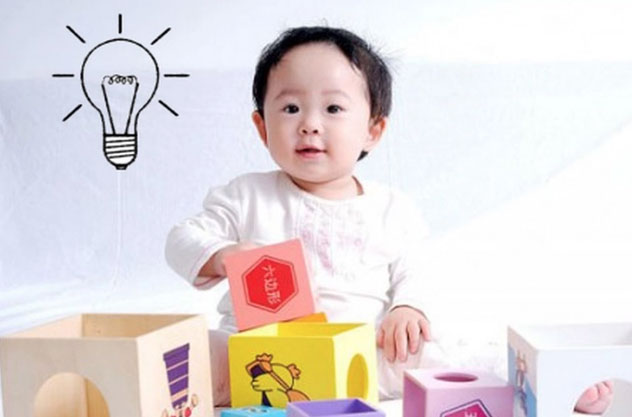1. Talk to children
Communication is an important skill needed to enhance a child's intelligence. The skill allows the child to bond with people, develop self-esteem, and confidence. Parents encourage their children to improve their communication skills by participating in activities.
Parents should talk to their children about what they are doing, how their day went... Adults should also teach children about body language and use it in conversations.

Communication is an important skill needed to enhance a child's intelligence. Illustration photo
2. Read books to your children
Reading to children also helps with brain development. "Children whose parents read to them every day tend to have higher IQs," Roche writes. "This is especially true if you make reading an interactive process.
Instead of just letting your child listen, you can use different voices and emotions while reading, so that your child interacts with the story. You can also ask questions to see if your child understands the story, such as "What do you think he is thinking?" or "What do you think will happen next?"
3. Take your children out more
Taking children outside is a great opportunity to expand their senses. When children smell the flowers, see the leaves, hear the birds and insects, they will receive more information from the outside world . They will feel more and their understanding of the world will be clearer.

Taking children outdoors is a great opportunity to expand their senses. Illustration photo
4. Nurture children's scientific thinking
Scientific thinking can be understood as people's observations and experiences when creating questions around a certain issue. Through these questions, the systems in the brain will verify and deploy new arguments to approve or reject them.
Scientific thinking is very important for children. In fact, people who achieve success in life all have good scientific thinking. Once they have this skill, children will know how to analyze dialectically and think logically. Scientific thinking is the bridge between practice and theory.
Children with scientific thinking and children without scientific thinking will have different thoughts when looking at the same thing. For example, when two children are playing and it suddenly rains, children without scientific thinking will only feel disappointed because they cannot continue playing, and will not have any other ideas.
But a child with a scientific mindset will not only see the scene before his eyes but will actively think about why it rains, where it comes from, how it forms and where it ends,...
Some theories and knowledge cannot be understood through memorization, and children with scientific thinking tend to find the truth through practice. Therefore, children with good scientific thinking will have stronger practical ability. Besides, children with good scientific thinking are always thirsty for knowledge.
3-6 years old is the best stage for children to develop their intelligence and cultivate their thinking. To train children's scientific thinking, parents can do scientific experiments with their children at home, and at the same time prepare the necessary books to popularize knowledge for their children.
5. Nutritious diet
When your baby starts eating solid foods, make sure to feed him/her nutrient-rich foods to help with cognitive development. Foods such as eggs, green leafy vegetables, fruits, nuts and seeds are rich sources of vitamins and minerals essential for overall healthy growth.
6. Introduce children toeducational toys
Educational toys can help children practice various skills, including concentration, observation, etc. In addition, educational toys also help children practice thinking and practical skills.

Educational toys can help children practice different skills. Illustration photo
7. Let children exercise regularly
Harvard University professor John Reddy and his scientific research team conducted many experiments to prove that exercise is really good for brain development.
Compared to children who are sedentary or do not exercise, children who exercise a lot have a larger prefrontal cortex area. The prefrontal cortex mainly affects children's attention span and memory level. In addition, regular exercise also has the effect of promoting the development of children's brains, making them healthier and smarter.
So how long is the most appropriate exercise time? Science has not yet given a specific and clear number. However, a study once found that the best exercise time that can actually promote brain development is about 5-10 minutes of exercise.

Regular exercise also helps children's brains develop fully, becoming healthier and smarter. Illustration photo
8. Encourage children to be curious
Children are naturally curious, and stimulating their curiosity can help them learn more. Parents stimulate their child's interest by providing them with many opportunities to explore new things.
Adults should praise children when they conquer difficult challenges. Parents should give children friendly toys to play with, stimulate their imagination to develop from daily activities.
9. Trust your child's intelligence
It's a strategy that sounds counterintuitive, but it works. In a groundbreaking study called "Believing You're Smart Makes You Smarter," psychologists teach students that intelligence isn't a fixed trait, but can be changed and increased. It's been proven.
They found that students who received this message performed better academically and took their studies more seriously than those who didn't. For parents, this finding also offers a course of action. Tell your kids they're smart, expect them to be smart, and make sure they know that tomorrow can be smarter than today.
Source: https://giadinh.suckhoedoisong.vn/9-phuong-phap-duoc-cac-chuyen-gia-danh-gia-la-hieu-qua-de-cai-thien-tri-thong-minh-cho-tre-172240624145953696.htm









































































































Comment (0)